 (Disponible en Français) Founder and managing director of Dragonfly Group, a human resources consulting firm, Eric Tarchoune is living in Shanghai. Based in China for more than 20 years, he gives advice to turn the Chinese professional life into a success.
(Disponible en Français) Founder and managing director of Dragonfly Group, a human resources consulting firm, Eric Tarchoune is living in Shanghai. Based in China for more than 20 years, he gives advice to turn the Chinese professional life into a success.
« The Chinese people expect a true human investment, equal to their own involvement. »
What is the best way to prepare for the first steps in China as a French expat?
The wrong wording of the French expats’ perception, which is different from the Chinese one in many respects, may lead to many misunderstandings. It may endanger the management of the company subsidiary they have just joined. The French-Chinese cultural biases include as well the notion of time as the logic of analysis, the relation in the hierarchy, the decision process, the project management priorities, the way of communicating. As a matter of fact, China’s newcomers must learn to view a whole value system through another prism. The only way to succeed in this is to tame the culture.This stage is fundamental in order to assimilate the Chinese universe’s rules of the game. That is why, I advise the future expats to attend a training to acquire the basic cultural notions before their departure. Then, during the first months following their China’s arrival, an individual support in the form of a coaching is far from being a waste of time. It prevents wrong moves. It fosters both professional and personal integration. However, this path will be successful only if the expat shows respect and a true interest to others.
What are the skills needed to work in China?
The large French corporations’ headquarters are used to send abroad rather the employees with a good English level. Regarding China’s vacant jobs, I don’t think that it is the best tactic. It is more clever to choose a professional who excels in his specialty, able to catch up in Shakespeare language, eventually thanks to an additional training. On the ground, the expats have to show their ability quickly. They face many very competent and reactive professionals. Used to competition, they have an impressive working capacity and mental gymnastic. Among the attributes required to manage in the Middle Kingdom, I would quote the flexibility, the capacity to make decisions, but also to question oneself. I would add the potential to work without counting the hours and the respect for the Chinese culture. In this regard, the respect for others, with a bit of modesty and thoughtful curiosity, is the key driver of the harmony within a multicultural team.
A three years expatriation, is it profitable?
Such a short expatriation is a heresy – although this is the rule within numerous companies – unless its goal is to quickly transfer an expertise to the local team. In China, it is absolutely necessary to be there for the long haul. The relationships deepen slowly. The Chinese people expect a true human investment (as it comes naturally to them) equal to their own involvement. Three years only are not enough to initiate a constructive strategy on the ground. It is hardly the time needed to go beyond the setting-in period and to begin to be able to rely on a trusted network.
In China, can we use the same employee evaluation methods as in France?
Not at all. For example, the “360-degree feedback” method (which comes from the United States) should not be used. It consists in estimating the team leader’s skills by collecting the feedbacks of his entire professional circle. In China, this method cannot work because expressing criticisms toward the hierarchy is a sacrilege. Besides, the Chinese communicate in a positive way: failures are untold whereas the success are highlighted. We do not say: « the A project is a failure. » We shall say rather: « the B project is a success, » implying that the A project should have been better handled. Whatever happens, the face must be kept, in particular in public. This basic rule has to be respected in any circumstances. It is thus advisable to favor constant feedbacks between the manager and his subordinates in the privacy of a one to one meeting.
How could France cope with its deficit of human resource able to work in China?
China is one of the most expanding business opportunity for the French companies. Yet, they are sorely lacking collaborators with adequate knowledge of the Chinese culture and language to penetrate into China’s market. Nevertheless, the Mandarin trainings’ offer is spreading from the middle school (college), the high school to the universities, in Paris with the INALCO (“Institut national des langues et civilisations orientales”) and Jussieu, or in other cities (Lyon, Aix-en-Provence, etc.). However, it turns out that French companies do not use enough this outstanding source of talented people. Drawing their attention on this valuable human resource may be a solution to develop their presence in the Middle Kingdom in a more efficient manner.
(27/04/2017)
Special report « Working in China »
Read more:
Creating harmony, the key of success. In order to avoid misunderstandings and deadlocks, the first move of the newcomer in China is to be aware of the different perceptions. (…) (Disponible en Français)

